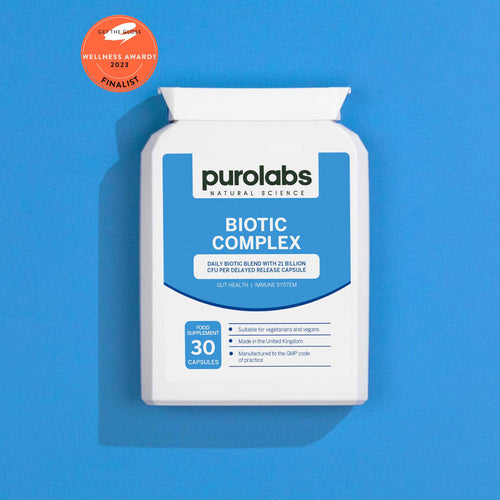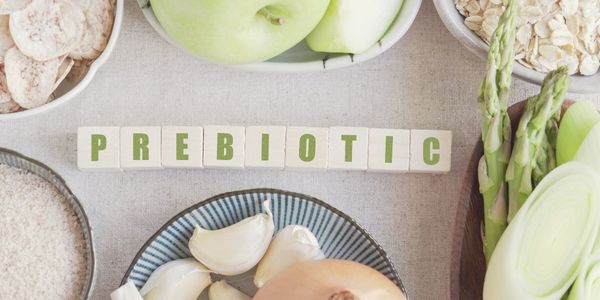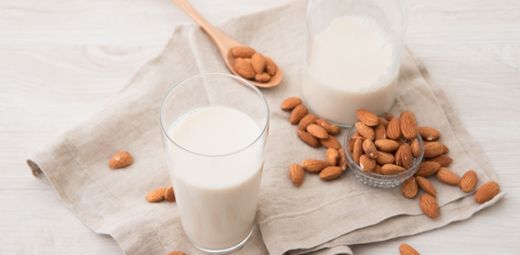Prebiotics (not to be confused with probiotics) are found in a range of plant-based whole foods and are known to support good gut health. A good way to distinguish the difference between probiotics and prebiotics is1:
Prebiotics – Food for the organisms that reside in us
Probiotics – The actual bacteria and living microorganisms themselves
We need both prebiotics and probiotics to populate and support the growth of healthy gut bugs.
It’s fairly well established that good gut health is fundamental when it comes to tackling pretty much any health problem. It has also been shown to even improve physical and mental longevity and helps support well-being and cognitive function.
I’m beginning to think that there’s nothing good gut health can’t solve or at least help improve.
Our microbiome is heavily studied these days, with low bacterial diversity and population showing more frequently in those suffering from chronic health disease2.
Numerous studies have also unearthed a noticeable change in gut microbiota with obesity, cancer and even types of neurodegenerative disease3.
Prebiotics, therefore, are even more important to explore when looking to populate our guts with beneficial health-boosting microorganisms.
Prebiotics are undigestible fibre-rich carbohydrates that are broken down by bacteria in our intestines. A fact that I find fascinating is that the human body cannot digest fibre – it is the living species in our digestive tracts that ‘eat’ it. Hence why fibre is great for bulking stools and helping to relieve digestive complaints like constipation4.
Foods that are particularly high in prebiotics are5:
- Kiwis
- Garlic
- Bananas
- Asparagus
- Apples
- Fennel
- Leek
- Legumes
There are however conditions such as IBS that result in many fibre-rich foods causing bloating and abdominal pain and even constipation, however, I will save that lengthy explanation for another post!
Read on to learn about how prebiotics affects our health.
1. Improves Digestive Health
As mentioned, prebiotics are food for our gut bacteria and help to shape the ecology of our microbiome6.
As mentioned, prebiotics shapes the terrain of our gut and help to grow beneficial bacteria, to help reduce the change of infections and digestive diseases. They do this by lowering the gut pH to inhibit pathogenic growth7.
As also mentioned, they are great for helping to relieve constipation and keep us happily ‘regular’.
2. Boosts Immune Health
As prebiotics are protective of gut health by reducing the prevalence of pathogenic bacteria, they help to improve the functionality of the gut by reducing inflammation and improving the structural integrity of the gut lining.
Impaired gut lining aka ‘leaky gut’ has been linked to various autoimmune conditions8.
3. Protective Against Diabetes
Along with probiotics, prebiotics has been shown to improve insulin sensitivity and glucose regulation by eliminating pathogenic endotoxins in the digestive tract. This process helps to support healthy blood sugar levels and helps us to become less insulin resistant.
As prebiotics are rich in fibre, this helps create a sensation of fullness, which helps to support appetite control which helps stabilise blood glucose regulation. These factors have been studied for their contribution to the progression of type 2 diabetes9.
4. Reduces Inflammation
Prebiotics has been shown to be protective against inflammatory digestive conditions like gastroenteritis and other infections as it helps to reduce inflammation-producing pathogenic bacteria strains10.
Prebiotics, therefore, help the immune system function, to aid the immune system to protect us from the effects of chronic inflammation.
5. Increases Nutrient Absorption
Dysbiosis, aka, an impaired gut microbiome hinders nutrient absorption in the intestines which are problematic for many reasons. Prebiotics has been shown to help improve the acidic environment in the gut as mentioned, to allow for improved nutrient digestion and absorption11.
Calcium, vitamin K & B12 absorption improves considerably with the help of prebiotics12.
6. Improves Skin Health
Pathogenic microbe populations are commonly higher in the stool samples of those with chronic skin conditions.
The link between gut and skin health, although still a relatively new discovery, is increasingly becoming a well-researched one with much anecdotal evidence pointing to its link. In a nutshell, an impaired microbiome leads to impaired skin function.
Quite simply, inflammatory processes occurring on the inside, show as inflammation on the outside, and often shows on our skin in the form of acne, psoriasis, eczema and general red irritated, itchy and flaky skin.
7. Helps to Balance Hormones
Many hormones are created through prebiotic fermentation in the intestines13.
Fibre-rich prebiotics helps us to excrete excess hormones effectively via our stool. Believe it or not, hormones are excreted through our stool, therefore our gut function needs to be optimal to help the body rid itself of excess hormones. If we are chronically constipated, for example, this can show in the form of oestrogen dominance14.
As hormones work on a balancing scale, too much of one hormone leads to a decrease in the other, making hormonal balance the goal when it comes to supporting hormonal health, at any stage of life and for any gender.
8. Improves Mental Health
Our gut and brain are integrally linked through a process known as the gut-brain axis. The gut-brain axis is a two-way communication between the brain and the gut through signalling by the ecology of our microbiome and neurons in the brain.
Strains of bacteria affect the way neurons are created and function, and as they control hormone production and excretion, this also impacts thyroid health and spikes in stress hormones15. Fascinating!
Studies show that prebiotics and probiotics could even potentially be a natural remedy for depression and anxiety disorders16. With modern living increasingly affecting our stress response, sleep, anxiety and mood disorders, discoveries in the gut-brain axis could mean incredible improvements for a range of mental health conditions and general well-being. Watch this space…
Can I Take a Prebiotic Supplement?
Although you can take dietary prebiotics, there are a few factors to consider which may persuade you to opt for prebiotics in the supplemental form:
- Supplements are generally more potent than food sources, therefore a higher dose can be administered effectively.
- You can track exact dosages as food sources can vastly vary.
- No matter what dietary plan you’re on, supplementation can help keep the prebiotic count high
Our Biotic complex contains the perfect balance of both probiotics and prebiotics to help build a healthy thriving microbiome, to help with all the benefits mentioned in this article.

Biotic Complex
Ensure to start off slow and steady with supplementation as the microbiome needs several days to adjust to increased levels of beneficial bacteria.
To avoid potential side effects, start supplementing with a low dose and gradually increase the recommended intake over several days. If any digestive symptoms continue after one week, please contact your GP or registered health professional.
It is also important to note that gut health no matter what health concern or improvement to your health you are making, can be complex to treat. Consider speaking to a qualified health practitioner if you are experiencing chronic gut health issues.





















